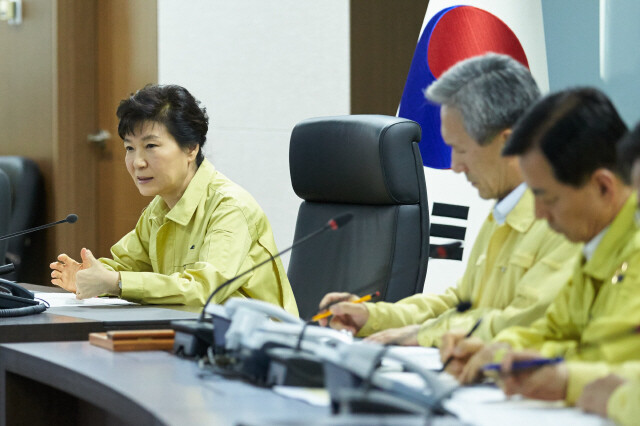hankyoreh
Links to other country sites 다른 나라 사이트 링크
[Editorial] With inter-Korean tensions rising, we must prevent a crisis

North and South Korea had an exchange of fire on the afternoon of Aug. 20 at the western front in Yeoncheon County, Gyeonggi Province. Residents near the armistice line had to endure a borderline wartime situation of having to evacuate. North Korea also called the South’s propaganda broadcasts a “declaration of war” and said it would resume military action if they weren’t halted in two days. Tensions are mounting rapidly. It’s a situation that calls for sternness, but also restraint.
According to the South Korean Ministry of National Defense, the North Korean military fired what were believed to be several rockets toward the south in the afternoon. No particular damage was reported, but radar did show signs of the shells coming in. The only conclusion possible at this point is that they were deliberately fired by the North. The government there had already been threatening “indiscriminate strikes” over the loudspeaker broadcasts, which South Korea’s military resumed this month in the wake of a mine explosion that maimed two soldiers in the Demilitarized Zone (DMZ). They also vowed a “harsh military response” to the Ulchi Freedom Guardian joint military exercises with the US, which began on Aug. 17. For now, it appears the aim of the North‘s attack was to back up the threat and gauge the South’s response. When the North fires shells toward the South, that amounts to a provocation that cannot be overlooked.
A little over an hour after the rockets were fired, the South Korean military fired dozens of 155-mm shells toward the source. It was perhaps the obvious response - but we should consider whether it was an appropriate one. Even a small clash has the potential to escalate into a serious engagement. The armistice line region is still only in a state of ceasefire, and things could very easily erupt into a major crisis. The rule of thumb here is restraint. When the DMZ mine explosion first occurred just a few weeks ago, the military and administration on the South side appeared very uncoordinated and incapable of making the right decisions early on. Not responding quickly enough is one problem, but the consequences of going too far could be even worse.
The important thing now is the keep things on stable footing. North Korea’s “two-day” time limit was a sign of how seriously it views the situation. The North is very sensitive about loudspeaker broadcasts, which it views as an insult against its “supreme dignity,” namely leader Kim Jong-un. That’s where its focus lies. Meanwhile, the Ulchi Freedom Guardian exercises are continuing until Aug. 28. There‘s no reason for us to simply accede to Pyongyang’s every demand, but we ought to question whether it solves things to keep the broadcasts going when we know they will only raise tensions further.
Pyongyang, for its part, should stop the provocations and agree to dialogue with Seoul. It could even discuss the issue of halting the broadcasts if dialogue were to happen. Military clash don’t help anyone; they just make the crisis worse. The military and the administration should choose an appropriate response and work on finding ways to prevent that crisis.
Please direct questions or comments to [english@hani.co.kr]

Editorial・opinion
![[Editorial] Does Yoon think the Korean public is wrong? [Editorial] Does Yoon think the Korean public is wrong?](https://flexible.img.hani.co.kr/flexible/normal/500/300/imgdb/original/2024/0417/8517133419684774.jpg) [Editorial] Does Yoon think the Korean public is wrong?
[Editorial] Does Yoon think the Korean public is wrong?![[Editorial] As it bolsters its alliance with US, Japan must be accountable for past [Editorial] As it bolsters its alliance with US, Japan must be accountable for past](https://flexible.img.hani.co.kr/flexible/normal/500/300/imgdb/original/2024/0417/6817133413968321.jpg) [Editorial] As it bolsters its alliance with US, Japan must be accountable for past
[Editorial] As it bolsters its alliance with US, Japan must be accountable for past- [Guest essay] Amending the Constitution is Yoon’s key to leaving office in public’s good graces
- [Editorial] 10 years on, lessons of Sewol tragedy must never be forgotten
- [Column] A death blow to Korea’s prosecutor politics
- [Correspondent’s column] The US and the end of Japanese pacifism
- [Guest essay] How Korea turned its trainee doctors into monsters
- [Guest essay] As someone who helped forge Seoul-Moscow ties, their status today troubles me
- [Editorial] Koreans sent a loud and clear message to Yoon
- [Column] In Korea’s midterm elections, it’s time for accountability
Most viewed articles
- 1[Column] The clock is ticking for Korea’s first lady
- 2[Editorial] When the choice is kids or career, Korea will never overcome birth rate woes
- 3[Guest essay] How Korea turned its trainee doctors into monsters
- 4[Editorial] As it bolsters its alliance with US, Japan must be accountable for past
- 5S. Korea, Japan reaffirm commitment to strengthening trilateral ties with US
- 6Korea, Japan jointly vow response to FX volatility as currencies tumble
- 7Gangnam murderer says he killed “because women have always ignored me”
- 8Japan officially says compensation of Korean forced laborers isn’t its responsibility
- 9[News analysis] After elections, prosecutorial reform will likely make legislative agenda
- 10‘Right direction’: After judgment day from voters, Yoon shrugs off calls for change